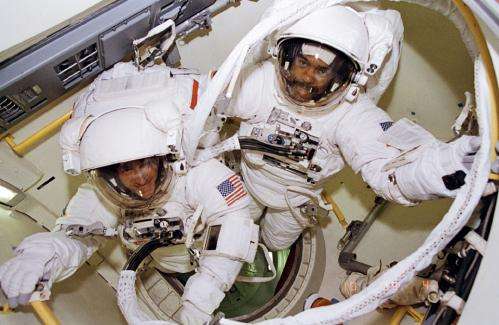Building a better team—on Mars

Sometime in the next quarter-century, NASA plans to send the first humans to Mars, a mission that will push the boundaries of teamwork for a handful of astronauts who will spend as long as three years together in a tiny capsule.
A Michigan State University project, now wrapping up its third year, aims to arm the crew with innovative devices to monitor interactions and provide instant feedback when conflict or other issues with team cohesion arise.
NASA recently awarded the project $1.2 million for another three years, bringing the total funding from the space agency to $2.5 million.
"We're developing a measurement system that captures the dynamics of team effectiveness in real time and then supplies that information back to the team members so they can use it to maintain their effectiveness," said Steve Kozlowski, lead investigator on the project and professor of psychology.
Each astronaut would get a device, or badge, which could end up being the size of a smart phone. The badge measures a number of activities including heart rate, motion, vocalization and face time between crew members. It could tell, for example, if a team member gets loud or turns away from a conversation abruptly – actions that, when done repeatedly, could signal a problem.
The badges are in development. A rudimentary version has proved effective in a lab setting and will now be measured in the field.
Kozlowski said the research team is collecting daily, "diary-type" information from scientific teams serving in isolated and extreme conditions similar to what astronauts encounter, including Antarctica. That information will help researchers develop a coherent picture of team functioning as they develop the badges.
Ideally, Kozlowski said, the badge would be capable of identifying an issue and relaying that information immediately to the NASA crew member, the crew leader or the entire team.
"It's really about giving the team tools that it can use to monitor its own psychosocial health – in other words, 'how are we doing'? – and if there any threats to that psychosocial health, offer early warnings so it can be dealt with it before it becomes a big problem," Kozlowski said.
Provided by Michigan State University
















